高二英语选修四知识点归纳
新教材人教版高中英语选择性必修第四册全册各单元重点语法汇总
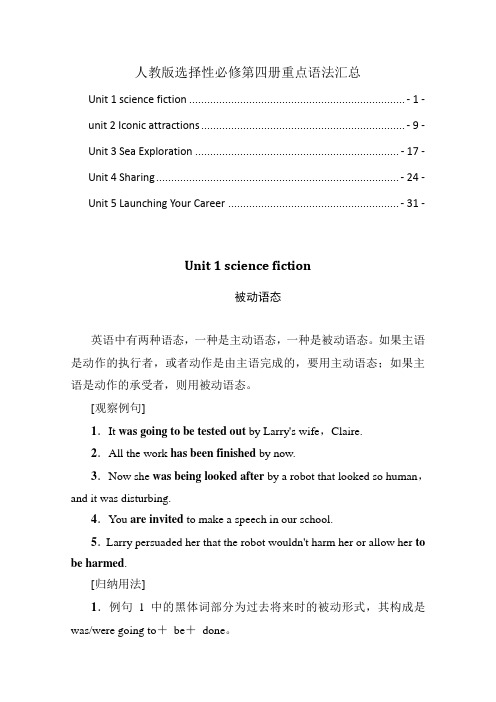
人教版选择性必修第四册重点语法汇总Unit 1 science fiction ........................................................................ - 1 - unit 2 Iconic attractions .................................................................... - 9 - Unit 3 Sea Exploration .................................................................... - 17 - Unit 4 Sharing ................................................................................. - 24 - Unit 5 Launching Your Career ......................................................... - 31 -Unit 1 science fiction被动语态英语中有两种语态,一种是主动语态,一种是被动语态。
如果主语是动作的执行者,或者动作是由主语完成的,要用主动语态;如果主语是动作的承受者,则用被动语态。
[观察例句]1.It was going to be tested out by Larry's wife,Claire.2.All the work has been finished by now.3.Now she was being looked after by a robot that looked so human,and it was disturbing.4.You are invited to make a speech in our school.5.Larry persuaded her that the robot wouldn't harm her or allow her to be harmed.[归纳用法]1.例句1中的黑体词部分为过去将来时的被动形式,其构成是was/were going to+be+done。
高二选修4英语知识点总结
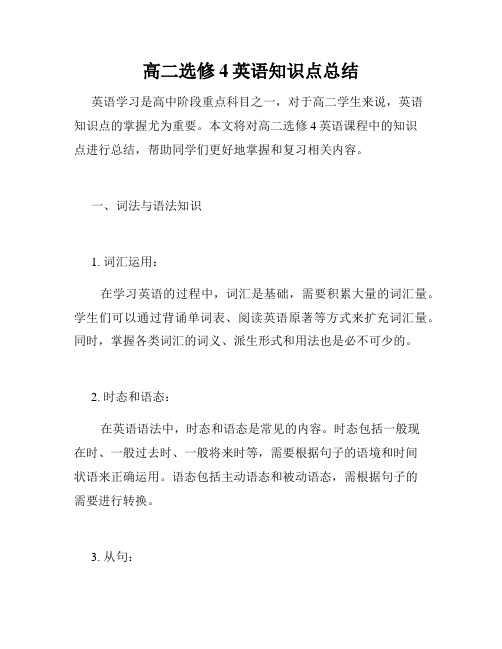
高二选修4英语知识点总结英语学习是高中阶段重点科目之一,对于高二学生来说,英语知识点的掌握尤为重要。
本文将对高二选修4英语课程中的知识点进行总结,帮助同学们更好地掌握和复习相关内容。
一、词法与语法知识1. 词汇运用:在学习英语的过程中,词汇是基础,需要积累大量的词汇量。
学生们可以通过背诵单词表、阅读英语原著等方式来扩充词汇量。
同时,掌握各类词汇的词义、派生形式和用法也是必不可少的。
2. 时态和语态:在英语语法中,时态和语态是常见的内容。
时态包括一般现在时、一般过去时、一般将来时等,需要根据句子的语境和时间状语来正确运用。
语态包括主动语态和被动语态,需根据句子的需要进行转换。
3. 从句:从句是英语中常见的句式,包括宾语从句、定语从句、状语从句等。
在使用从句时,需要注意引导词的选择和位置,同时要注意主句与从句之间的逻辑关系。
二、阅读与写作技巧1. 阅读技巧:在进行英语阅读时,可以通过阅读理解与推理、提取信息、判断真假等方式来全面理解文章的内容。
同时,要注意阅读文章的结构和段落布局,提高阅读速度和理解能力。
2. 写作技巧:英语写作需要注意语法、词汇和句型的准确运用,同时要注重篇章结构的合理布局。
写作时可以运用一些连接词、过渡词和复合句等手段,使文章更加连贯、流畅。
三、听力和口语提高1. 听力技巧:在进行英语听力练习时,可以通过多听多练、多模仿的方式提高听力水平。
可以选择一些英语听力材料,如英语电影、英语新闻等来提高听力理解能力,同时也要注意掌握一些常见的听力技巧。
2. 口语表达:口语表达是英语学习的重要方面,要通过大量的口语练习来提高口语水平。
可以参加英语角、与外教交流等方式来提高口语表达能力。
同时,也要注意语音语调的准确运用,做到发音清晰、语调自然。
总结:高二选修4英语课程中的知识点包括词法与语法知识、阅读与写作技巧以及听力和口语提高。
同学们在学习过程中要注重积累词汇量,掌握时态和语态的用法,运用好各类从句。
选修4必考知识点总结

选修4必考知识点总结选修4是高中英语课程中的一门选修课,是高中阶段学习的重要组成部分。
选修4主要围绕着文化和社会问题展开,为学生提供了更广阔的语言和文化视野。
在这门课程中,学生将学习到许多重要的知识点,这些知识点对于学生之后的学习和工作都具有重要的指导意义。
在本文中,我们将对选修4必考知识点进行总结,为学生的学习提供一些帮助和指导。
1. 文化与价值观文化与价值观是选修4中的重要知识点。
在这一部分内容中,学生将学习到不同文化之间的差异和相似之处,以及这些文化差异对于人们的生活和行为习惯所产生的影响。
学生将学会理解和尊重不同文化的差异,从中学会如何与不同文化背景的人进行交流和沟通。
此外,学生还将学习到文化之间的相互影响和融合,了解全球化对于文化的影响和挑战。
2. 社会问题选修4中的社会问题是一个紧密联系着现实生活的知识点。
在这一部分内容中,学生将学习到一些重要的社会问题,如环境问题、贫富差距、种族问题等。
学生将学习到这些社会问题的成因和后果,以及如何从个人和社会层面进行改善和解决。
学生将学会表达和交流自己对于这些社会问题的看法和观点,并学会从多个角度思考和分析这些社会问题。
3. 媒体与信息传播媒体与信息传播是选修4中的另一个重要知识点。
学生将学习到媒体对于社会的影响,以及不同类型的媒体对于信息传播的作用和影响。
学生将学会如何对待媒体传播中的信息,如何分辨信息的真伪,并学习到媒体传播对于个人和社会的影响。
此外,学生还将学习到如何运用媒体进行信息传播,提高自己的传播能力和素养。
4. 科技与社会科技与社会是选修4中的另一个重要知识点。
在这一部分内容中,学生将学习到科技对于社会的影响和作用,以及科技发展对于社会结构和人们的生活方式所产生的影响。
学生将学会如何运用科技进行学习和工作,以及科技在社会发展中的作用。
学生还将学习到如何对待和利用科技,以及在科技发展中保护环境和人类利益。
5. 艺术与创新艺术与创新是选修4中的另一个重要知识点。
人教版高中英语选修四Unit 1 Science Fiction单元知识点归纳(单词、短语、句子)
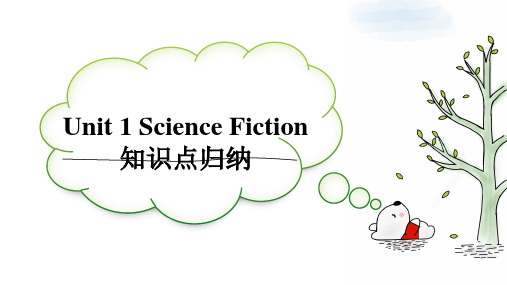
appointment
1. She had failed to keep her appointment for third times._失__约__ 2. They congratulated him on his appointment as chairman.
__任__命___ 3. He has taken up an appointment as Professor of Chemistry.
→ appointment n.约会; 预约; 委任
appointment n.约会; 预约; 委任
make / keep an appointment
I have an appointment with my dentist at 11:30. She had an appointment to paint her nails. He holds an appointment in the English Department at present. They congratulated him on his appointment as president.
_职__位__ 1. I have an _a_p_p_oi_n_tm__e_n_t (appoint) at the doctor’s. 2. She has an appointment ____w_i_th____ her friend, but she have to change it.
我约好了这周末去做美甲。(appointment, paint) __I_h__a_v_e_a_n__a_p_p_o_in_t_m__e_n_t_t_o_p_a_i_n_t_m__y_n_a_i_ls__th_i_s_w__e_e_k_e_n_d_. __________ __
英语选修四单词知识点总结

英语选修四单词知识点总结Unit 1: Cultural relics1.1 Vocabulary1.1.1 AncientAncient means belonging to the very distant past and no longer in existence. For example, "The ancient civilization left behind many cultural relics for us to discover."1.1.2 CivilizationCivilization refers to the stage of human social development and organization which is considered most advanced. For example, "The ancient Egyptian civilization built the great pyramids and left behind many cultural relics."1.1.3 HeritageHeritage refers to something that is handed down from the past, as a tradition. For example, "The heritage of the ancient Chinese civilization is profound and precious."1.1.4 RelicA relic is an object surviving from an earlier time, especially one of historical or sentimental interest. For example, "The relic of an ancient statue was found during the archaeological excavation."1.1.5 ArchaeologyArchaeology is the study of human history and prehistory through the excavation of relics and artifacts. For example, "The archaeology team discovered many valuable relics during their excavation."1.2 ApplicationThe vocabulary in this unit is related to the theme of cultural relics and archaeology. It is important to understand these words in order to comprehend and discuss the significance of cultural relics from ancient civilizations.Unit 2: Working the land2.1 Vocabulary2.1.1 AgricultureAgriculture refers to the science or practice of farming, including cultivation of the soil for the growing of crops and the rearing of animals to provide food, wool, and other products. For example, "The development of agriculture led to the rise of human civilization."2.1.2 CultivateCultivate means to prepare and use (land) for crops or gardening. For example, "Farmers cultivate the land to produce a variety of crops."2.1.3 FertilizerFertilizer is a chemical or natural substance added to soil or land to increase its fertility. For example, "Farmers use fertilizers to improve the quality of the soil for better crop yield." 2.1.4 IrrigationIrrigation is the artificial application of water to the land or soil. For example, "The farmers install irrigation systems to ensure sufficient water supply for their crops."2.1.5 HarvestHarvest refers to the process of gathering a crop. For example, "The farmers had a bountiful harvest this year due to favorable weather conditions."2.2 ApplicationThe vocabulary in this unit is essential for understanding the agricultural process, including farming, cultivating, and irrigation. It is important for students to learn these words to grasp the techniques and practices involved in working the land.Unit 3: Travel journal3.1 Vocabulary3.1.1 DestinationDestination refers to the place to which someone or something is going or being sent. For example, "Their dream destination is to visit the Eiffel Tower in Paris."3.1.2 ItineraryItinerary is a planned route or journey. For example, "The travel agency provided a detailed itinerary for the trip to Japan."3.1.3 AccommodationAccommodation refers to a room, group of rooms, or building in which someone may live or stay. For example, "The hotel offers comfortable accommodation for tourists visiting the city."3.1.4 CuisineCuisine is a style or method of cooking, especially as characteristic of a particular country, region, or establishment. For example, "The Italian cuisine is known for its pasta and pizza dishes."3.1.5 SouvenirA souvenir is a thing that is kept as a reminder of a person, place, or event. For example, "They bought a souvenir from their trip to China as a memento of their journey."3.2 ApplicationThe vocabulary in this unit is related to travel and tourism, including destinations, itineraries, accommodations, cuisine, and souvenirs. It is crucial for students to understand these words in order to discuss and plan their travel experiences effectively.Unit 4: Wildlife protection4.1 Vocabulary4.1.1 ConservationConservation is the action of protecting the natural environment. For example, "Wildlife conservation is essential for maintaining ecological balance."4.1.2 HabitatHabitat refers to the natural home or environment of an animal, plant, or other organism. For example, "The destruction of forests has led to the loss of wildlife habitat."4.1.3 EndangeredEndangered means seriously at risk of extinction. For example, "The giant panda is an endangered species in China."4.1.4 PoachingPoaching is the illegal hunting or capturing of wild animals. For example, "The government has implemented strict measures to combat poaching."4.1.5 BiodiversityBiodiversity refers to the variety of plant and animal life in a particular habitat. For example, "The rainforest is home to a wide range of biodiversity."4.2 ApplicationThe vocabulary in this unit is crucial for understanding the issues surrounding wildlife protection and conservation. It is important for students to be familiar with these words todiscuss and address the challenges of protecting endangered species and preserving biodiversity.Unit 5: Science and nature5.1 Vocabulary5.1.1 EcologyEcology is the branch of biology that deals with the relations of organisms to one another and to their physical surroundings. For example, "The study of ecology helps us understand the interactions between living organisms and their environment."5.1.2 EcosystemAn ecosystem is a biological community of interacting organisms and their physical environment. For example, "The coral reef is a diverse and complex ecosystem."5.1.3 Climate changeClimate change refers to significant and long-term change in the Earth's climate. For example, "Climate change is a global issue that requires collective efforts to address."5.1.4 RenewableRenewable refers to a source of energy that can be replenished naturally. For example, "Solar power is a renewable energy source."5.1.5 PollutionPollution is the presence in or introduction into the environment of a substance or thing that has harmful or poisonous effects. For example, "The government is taking measures to reduce air pollution in urban areas."5.2 ApplicationThe vocabulary in this unit is related to science and nature, including ecology, ecosystem, climate change, renewable energy, and pollution. It is essential for students to understand these words to comprehend and discuss the environmental issues and scientific developments shaping our world.In summary, the vocabulary knowledge in English Optional Course Four covers a wide range of topics, including cultural relics, working the land, travel journal, wildlife protection, and science and nature. The understanding and application of these words are essential for students to engage in meaningful discussions and comprehend the content of the course. By mastering the vocabulary in each unit, students can enhance their language skills and expand their knowledge in various fields of study.。
高二选修4英语知识点
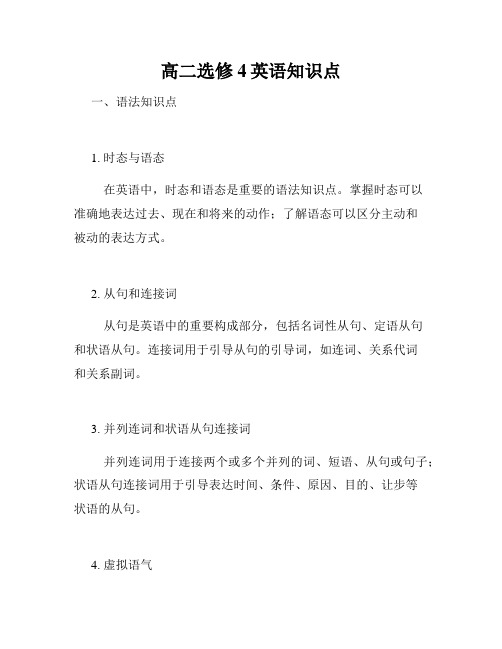
高二选修4英语知识点一、语法知识点1. 时态与语态在英语中,时态和语态是重要的语法知识点。
掌握时态可以准确地表达过去、现在和将来的动作;了解语态可以区分主动和被动的表达方式。
2. 从句和连接词从句是英语中的重要构成部分,包括名词性从句、定语从句和状语从句。
连接词用于引导从句的引导词,如连词、关系代词和关系副词。
3. 并列连词和状语从句连接词并列连词用于连接两个或多个并列的词、短语、从句或句子;状语从句连接词用于引导表达时间、条件、原因、目的、让步等状语的从句。
4. 虚拟语气虚拟语气是英语中表达假设、建议、愿望等情态的一种语气。
了解虚拟语气的用法可以使句子更富于变化和表达能力。
二、词汇知识点1. 同义词和近义词同义词是指意义相同或相近的词语,掌握同义词可以使语言更加地流畅和丰富;近义词是指意义接近但有微小差异的词语,了解近义词可以准确选择恰当的词汇。
2. 词义辨析词义辨析是指在多个相似的词语中选择正确的词义。
了解不同词义的使用场景可以提高语言表达的准确性和清晰度。
3. 词组和习惯用法词组是由两个或多个词汇组合而成的固定搭配,理解和掌握常用的词组可以使语言更加地地道和自然;习惯用法是指在特定语境中传统地使用的词语和表达方式。
三、阅读技巧1. 掌握词汇猜测技巧在阅读英语文章时,遇到生词时可以通过上下文等线索来猜测其意思。
掌握词汇猜测技巧可以提高阅读效率和理解力。
2. 阅读理解题解题技巧阅读理解题是英语考试中的常见题型,掌握解题技巧可以更准确地理解文章内容,快速找到答案。
3. 阅读速读技巧阅读速度是英语考试中的一个重要指标。
通过使用定位词和快速浏览等技巧,可以提高阅读速度和准确性。
四、写作技巧1. 句子结构变化英语写作中,句子结构的多样性可以丰富文章表达,提高语言水平。
掌握句子结构的变化可以使文章更加地有层次和吸引力。
2. 逻辑连接词的使用逻辑连接词在写作中用于连接句子和段落,使文章结构紧凑和连贯。
熟练使用逻辑连接词可以使文章的逻辑关系更加明确和顺畅。
英语选修四单词归纳总结
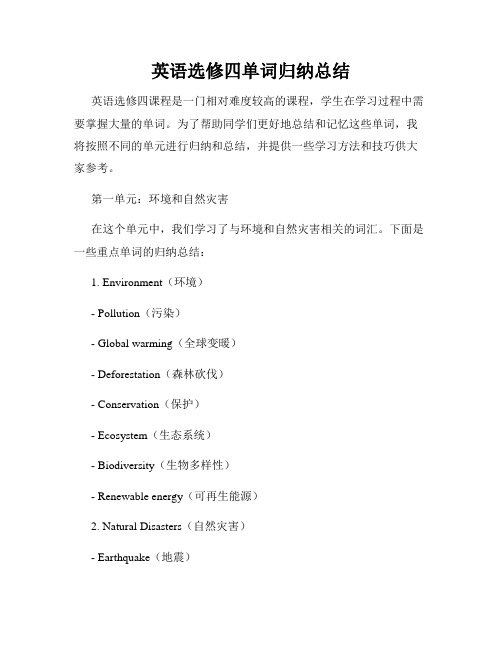
英语选修四单词归纳总结英语选修四课程是一门相对难度较高的课程,学生在学习过程中需要掌握大量的单词。
为了帮助同学们更好地总结和记忆这些单词,我将按照不同的单元进行归纳和总结,并提供一些学习方法和技巧供大家参考。
第一单元:环境和自然灾害在这个单元中,我们学习了与环境和自然灾害相关的词汇。
下面是一些重点单词的归纳总结:1. Environment(环境)- Pollution(污染)- Global warming(全球变暖)- Deforestation(森林砍伐)- Conservation(保护)- Ecosystem(生态系统)- Biodiversity(生物多样性)- Renewable energy(可再生能源)2. Natural Disasters(自然灾害)- Earthquake(地震)- Tsunami(海啸)- Hurricane(飓风)- Flood(洪水)- Drought(干旱)- Volcano(火山)- Tornado(龙卷风)学习方法建议:使用这些单词时,可以尝试编写一篇有关环境保护或自然灾害的文章或作文,这样有助于加深对这些单词的记忆和理解。
第二单元:媒体与传媒在这个单元中,我们学习了与媒体和传媒相关的词汇。
以下是一些重要单词的概括:1. Media(媒体)- Mass media(大众媒体)- Social media(社交媒体)- News(新闻)- Journalism(新闻业)- Advertising(广告)- Press(新闻界)2. Forms of Media(媒体形式)- Television(电视)- Radio(收音机)- Newspaper(报纸)- Magazine(杂志)- Internet(互联网)- Podcast(播客)学习方法建议:可以尝试通过观看新闻报道、听收音机或者编写一篇评论媒体的文章来使用这些单词,这样有助于提高对这些词汇的运用能力和理解。
高二选修4英语知识点归纳
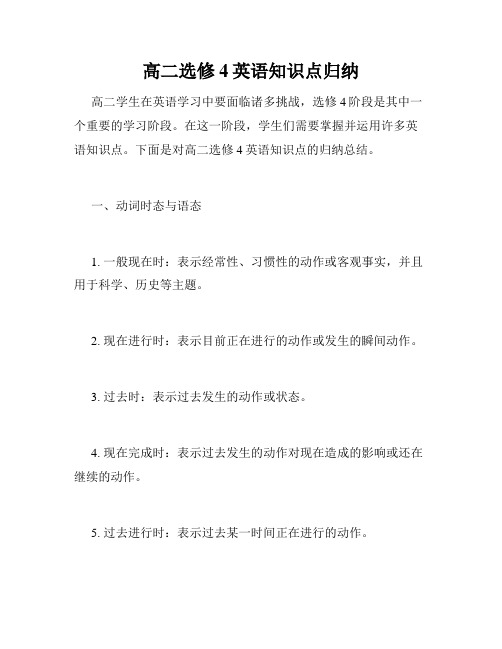
高二选修4英语知识点归纳高二学生在英语学习中要面临诸多挑战,选修4阶段是其中一个重要的学习阶段。
在这一阶段,学生们需要掌握并运用许多英语知识点。
下面是对高二选修4英语知识点的归纳总结。
一、动词时态与语态1. 一般现在时:表示经常性、习惯性的动作或客观事实,并且用于科学、历史等主题。
2. 现在进行时:表示目前正在进行的动作或发生的瞬间动作。
3. 过去时:表示过去发生的动作或状态。
4. 现在完成时:表示过去发生的动作对现在造成的影响或还在继续的动作。
5. 过去进行时:表示过去某一时间正在进行的动作。
6. 过去完成时:表示在过去某一时间或事件之前已经完成的动作。
7. 将来时:表示将来某一时间或情况下要发生的动作。
8. 被动语态:表示主动语态中的动作或者发生动作的主体是次要的。
二、从句和状语从句1. 定语从句:用于修饰名词或代词的从句。
2. 名词性从句:用作句子的主语、宾语、表语或同位语的从句。
3. 状语从句:用来修饰句子中其他成分(动词、形容词、副词)的从句。
三、词汇及短语1. 同义词和反义词:学习同义词和反义词的用法,丰富词汇量。
2. 词组和短语:学习常用的词组和短语,提高语言表达能力。
四、语法规则1. 名词:掌握名词的复数形式、所有格的用法和名词作为主语、宾语和表语的用法。
2. 形容词和副词:学习形容词和副词的比较级和最高级形式。
3. 介词和介词短语:学习介词的用法,特别是常用的介词短语。
4. 冠词:了解冠词的用法,特别是再讲述特定事物时使用的冠词。
五、阅读理解和写作技巧1. 阅读理解:学习如何准确理解文章中的意思,并提取关键信息。
2. 写作技巧:学习如何撰写各种类型的作文,如议论文、说明文等。
六、听力技巧学会使用合适的听力技巧,如预测答案、判断信息的真实性等。
七、口语表达练习口语表达,提高口语流利度和准确性。
以上是对高二选修4英语知识点的归纳总结,希望对同学们在学习中有所帮助。
在学习英语时,要注重积累词汇和短语,掌握语法规则,灵活运用各种句型和时态。
- 1、下载文档前请自行甄别文档内容的完整性,平台不提供额外的编辑、内容补充、找答案等附加服务。
- 2、"仅部分预览"的文档,不可在线预览部分如存在完整性等问题,可反馈申请退款(可完整预览的文档不适用该条件!)。
- 3、如文档侵犯您的权益,请联系客服反馈,我们会尽快为您处理(人工客服工作时间:9:00-18:30)。
高二英语选修四知识点归纳选修四是高二英语的一门重要课程,主要涵盖了英语的语法、词汇、阅读及写作等方面的知识点。
下面将对选修四中的一些重要知识点进行归纳和总结。
一. 语法知识点
1. 定语从句
定语从句是修饰名词或代词的句子,通常由关系代词或关系副词引导。
在定语从句中,关系代词有that, which, who, whose, whom等,而关系副词有where, when, why等。
定语从句的作用是进一步说明或限定名词的意义。
在使用定语从句时要注意关系词的选择和位置,以及主从句的时态和语态保持一致。
2. 虚拟语气
虚拟语气用于表达与事实相反、愿望、建议等情况。
虚拟语气的时态通常为过去时,常用的虚拟语气形式包括与过去事实相反的虚拟,如与过去事实相反的虚拟、与现在事实相反的虚拟、与
将来事实相反的虚拟等。
在运用虚拟语气时,需注意条件从句和主句的相应时态。
二. 词汇知识点
1. 同义词与近义词
同义词是指义相同或相近的词语,如big和large,happy和glad。
而近义词指意义相近但不完全相同的词语,如house和home,begin和start。
掌握常见的同义词和近义词,可以提高阅读和写作的准确性和表达能力。
2. 词根、词缀和派生词
词根是构成词汇的基本单位,它可以独立存在,也可以与其他词缀组合成新的词汇,如dict(说)和port(携带)。
词缀是附加在词根前后的字母或字母组合,可以改变词的词性或词义,如dis-(否定)、un-(不)、-ful(充满的)等。
派生词是由词根和词缀组成的新词,如dictionary(词典)和transportation(运输)。
三. 阅读理解知识点
1. 主旨大意
阅读理解中的主旨大意是指文章的中心思想或主要观点。
要准确抓住文章的主旨大意,需要综合考虑文章的标题、开头和结尾段落,以及重要信息点和关键词等。
在阅读理解中,找到主旨大意有助于更好地理解和答题。
2. 推理判断
推理判断是根据文章所提供的信息,结合自己的常识和推理能力,进行逻辑推断和判断。
在进行推理判断时,需要综合考虑文章的具体细节、上下文关系以及作者的意图等因素,合理推断出文章没有明确提及但可以推出的信息。
四. 写作知识点
1. 写作结构
写作结构是指文章的整体组织和框架,包括引言、主体和结论三个部分。
引言部分应该引起读者的兴趣并提出主题,主体部分应该展开论述,并提供事实、观点和例证,结论部分对主要观点进行总结概括,并给出个人观点或建议。
合理的写作结构有助于提高文章的逻辑性和连贯性。
2. 语言表达
语言表达是指用词准确、句子通顺、用词地道的能力。
在写作过程中,要注意选择恰当的词汇和短语,并注意句子的结构和语法正确性。
此外,还可以通过丰富的词汇和多样的句式来提高语言表达的质量和水平。
通过对选修四中的语法、词汇、阅读及写作等方面的知识点进行归纳和总结,可以帮助学生更加全面地理解和掌握这门课程的重点知识。
通过深入学习和实践运用,学生可以提高英语能力,为今后的学业和职业发展打下坚实的基础。
